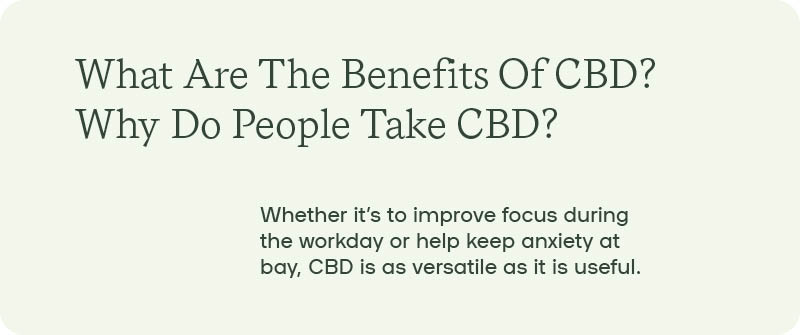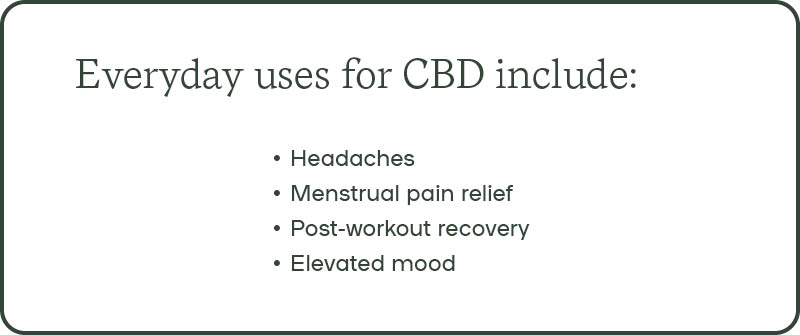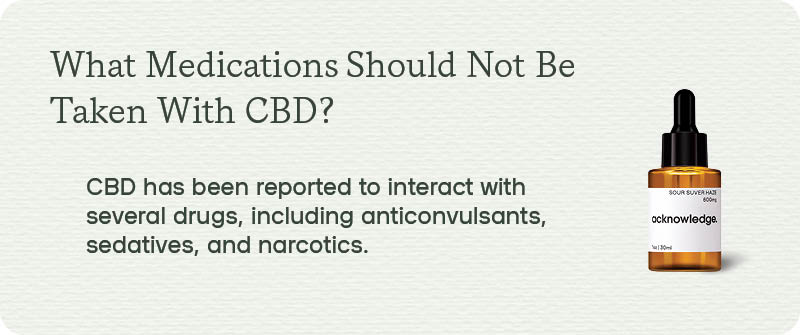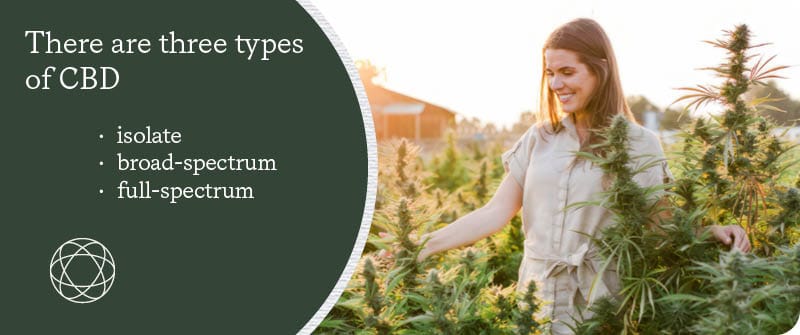A systematic review of both anecdotal experience and clinical trials shows CBD oil offers a wide range of health benefits. Whether you just want a little boost to get through the workday or you need something to help you relax afterward, CBD oil could be the solution you’re looking for.
Plus, there’s more than one kind of the best CBD oil, and there are options for people who are routinely subjected to workplace drug tests. It’s versatile and affordable, and it rarely has any side effects. Note that CBD is indeed different from medical cannabis or medical marijuana. In fact, CBD is an active ingredient derived from the hemp plant, not the cannabis plant.
With that in mind, let’s take a closer look at CBD oil, its benefits, and common, everyday uses — here’s a sneak peek at what’s inside this guide.
- What are the benefits of CBD?
- Top CBD oil uses
- What are the side effects of CBD oil?
- What medications should not be taken with CBD?
- Will CBD oil show up on a drug test?
What Are The Benefits Of CBD? Why Do People Take CBD?
There are so many reasons why people take CBD oil. Whether it’s to improve focus during the workday or help keep anxiety at bay, CBD is as versatile as it is useful. Let’s take a look at some of the more common reasons why people take CBD oil:

Energy, Focus, And Creativity (Sativas)
Pure CBD oils made from sativa strains tend to leave people with more energy, improved focus and inspired creativity. That’s because these strains help stimulate the mind — but because it’s CBD, it doesn’t deliver psychoactive effects.
For this reason, many people choose to take sativa-dominant oils during the day (also called daytime strains) or in the morning with a cup of coffee or tea.
Relaxation, Sleep, And A Sense Of Calm (Indicas)
This is the flip side of Sativa. Indica-dominant strains of CBD can help you relax at the end of a long workday, reduce anxiety, and encourage you to fall asleep faster (and stay asleep longer).
This is why CBD oils made with Indica strains are recommended for nighttime use. They relax and loosen up the body, getting you ready for a resultful sleep.
Chronic Pain And Inflammation
There’s a long-established relationship between inflammation and chronic pain management — especially when it comes to autoimmune conditions like rheumatoid arthritis and multiple sclerosis.
Some people choose to ingest CBD oil or apply it topically to help manage inflammation and treat pain that’s associated with it.
Top CBD Oil Uses
Alright — so we know why people take CBD oil. But what are some practical applications, or ways to use CBD oil in everyday life?
No matter what you do, there’s some level of stress to your job. The workday is tough for most of us. And even if it’s not too bad, maybe you have to be creative for hours on end. Or you have to pay close attention to details all day. Whatever it is, there’s a reason you’re tired afterward.
CBD oil can help you keep your focus for longer and give you creativity boosts when your reserves are running low.
Some of us can’t take CBD oil during the workday, and some of us just don’t need or want to. Instead, we wait until the end of the workday to relax, unwind, and fall into a deep, well-deserved sleep.
Other practical, everyday uses for CBD include:
- Headaches
- Menstrual pain relief
- Post-workout recovery
- Elevated mood
Research has also started to show that the benefits of CBD oil could include possibly helping with conditions such as Post Traumatic Stress Disorder (PTSD), inflammatory and neuropathic pain, sleep disorders, joint pain, cancer pain, mood disorders, Dravet Syndrome and more. Further research is needed for these treatments, but initial evidence is promising. However, it is important to talk with a healthcare professional before using nonprescription CBD products, such as topical CBD, to make sure it is a good and safe choice for your ailment. You’ll also want to check to make sure the CBD products don’t interfere with other medications you may be taking.
Disclaimer! The effects of CBD vary from person to person, and it’s not meant to “cure” anyone or anything. Research suggests that CBD may help support or may help manage certain symptoms — not get rid of conditions or cure diseases altogether.
What Are The Side Effects Of CBD Oil?
Like most things, CBD has its pros and cons — or positive side effects and negative side effects.
Positive side effects may include reduced anxiety, depression, pain, and inflammation. Many people experience a deeper sense of relaxation, increased focus, and enhanced creativity. Others report elevated moods, better sleep, and relaxed muscles.
But in some cases, CBD oil has negative side effects – even though they’re typically rare on the mild side. Side effects may include headaches, nausea, fatigue, diarrhea, changes in appetite, dry mouth, and more. Excessive CBD use may cause memory loss, irritability, or vomiting.
Some people shouldn’t take CBD at all if they have certain medical conditions or take certain types of medications — more on that below.

Are There Any Negative Side Effects Of CBD Gummies?
One of the things many of us love about CBD is that side effects are rare, and if they do occur, they’re usually pretty minor. Commonly reported side effects of taking CBD gummies include diarrhea, upset stomach, dry mouth, and fatigue.
Of course, if you take certain medications, those side effects could be different or more extreme. Talk with your doctor before making any changes to your health routine, like introducing CBD gummies into your diet.
Lastly, CBD gummies take a while to process in your body. They have to move through your digestive system, which can take several hours, depending on your metabolism. For this reason, doses are hard to get right, and effects can kick in at unexpected times.
If you want immediate effects, choose a different method of delivery that’s faster. We recommend sublingual oils and tinctures because they absorb relatively quickly in the bloodstream. Plus, oils and tinctures don’t have all the sugar that’s often packed into gummies.
What Medications Should Not Be Taken With CBD?
Even though it’s usually safe, CBD isn’t for everyone. CBD has been reported to interact with several drugs, including anticonvulsants, sedatives, and narcotics. That’s because CBD can inhibit certain enzymes, which can change the way that those drugs work.
Here’s a list of possible contraindications:
- Clobazam
- Stiripentol
- Valproate
- Diazepam
- Lamotrigine
- Barbiturates
- Codeine
- Morphine
CBD may also interact with SSRIs, beta-blockers, antipsychotics, blood thinners, opioids, immunosuppressants, and even some blood pressure medications.
If you aren’t sure whether CBD is a safe choice for you, talk with your doctor. They can help you identify possible contraindications or negative side effects of taking CBD with other prescription and non-prescription drugs.

What Is The Best Strength CBD Oil To Use?
Like most things, there’s no one-size-fits-all — how much CBD oil you take depends on so many things. For example, your body has its own unique chemistry that’s different from everyone else’s body chemistry.
Plus, you’re taller than some people and shorter than others. You may weigh more or less than other people. And you may prefer taking CBD oil more often or less often than other people.
The best strength for you isn’t the same as everyone else. For this reason, we recommend starting with a “low and slow” approach when it comes to CBD oil. The recommended dose for our CBD extracts is one to two droppers under the tongue, taken with a meal or right after a meal.
If you feel you need more, and you know you can safely increase the dose, then three sublingual drops are the right choice.
Is CBD Oil Legal?
Yes, CBD oil made from hemp (and not marijuana) is legal in most US states as long as it has 0.3% THC or less.
But, legality varies from state to state, and some conditions may apply. For example, in some states, there aren’t a ton of restrictions on hemp-derived CBD oil. But in others, you can only buy broad-spectrum (as opposed to full-spectrum).
We recommend you check your local laws to make sure you’re in compliance with what’s legal and what isn’t when it comes to CBD.
Will CBD Oil Show Up On A Drug Test?
The short answer is yes, CBD oil CAN show up on a drug test — now, whether or not it WILL comes down to a few things like:
Type Of CBD Oil
Most drug tests check for alcohol, amphetamines, benzodiazepines, opiates or opioids, cocaine, and marijuana. More specifically, when it comes to marijuana, tests check your levels of THC.
There are three types of CBD (isolate, broad-spectrum, and full-spectrum). Isolate is “pure” CBD — there’s nothing else in it, no THC, no terpenes, no nothing. Broad-spectrum has other things in it, like cannabinoids, terpenes, and flavonoids. But it doesn’t have ANY THC. Now, full-spectrum CBD is the same as broad-spectrum, but it has trace amounts of THC (up to 0.3%).
So, if you take full-spectrum CBD oil, you do, in fact, introduce trace amounts of THC into your system. This could possibly trigger a positive drug test.
Frequency Of Use
If you use full-spectrum CBD oil every day, you’re more likely to trigger a positive result for THC on a drug test. If you use it every now and then, those chances drop.
You can expect to trigger a workplace drug test if you take a full-spectrum CBD oil within 3 – 14 days of taking said test. But for people who take higher or more frequent doses, this could be up to 30 days or more.
Type Of Test
Most drug tests look for the same kinds of substances, but not all drug tests are the same. You’ve probably heard of a urine test (i.e., you pee in a cup). And there are other kinds of tests, too, like saliva and hair follicles.
Traces of THC don’t hang around in your saliva as long as they do in your urine — usually about three to five days. But THC does show up for a while on your hair, sometimes up to 90 days or more.
Brand Transparency
Like many dietary supplements, not all brands are 100% honest or 100% certain where their products come from. Sometimes brands use ingredients they shouldn’t or mislabel ingredients they think are one thing but are actually another. And not all brands thoroughly test their products with a third-party lab.
So check lab reports. Do more research. And be confident in the products you purchase. This way, you can feel safe about the CBD you put in your body and have more control over whether tests you test positive for.

How Acknowledge CBD Products Stand Out
If you’re searching for a CBD brand that you can trust, look no further than Acknowledge.
Our products are carefully sourced on our sustainable farm in Maryland’s Pleasant Valley. Each product is processed naturally and made with only the highest quality ingredients. While many other CBD brands offer less-than-pure products, we say no to additives, pesticides, and other harmful ingredients.
Want to see for yourself? Check out our transparent COAs to see exactly what is in each of our products.
Try our CBD line today and see and feel the Acknowledge difference.
The content provided by Acknowledge CBD is for informational purposes only and is not intended as medical advice. Always consult your healthcare provider before starting any new treatment or if you have any questions regarding a medical condition. Do not disregard professional medical advice or delay seeking it based on information from this site. Reliance on any information provided by Acknowledge CBD is solely at your own risk.